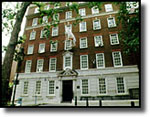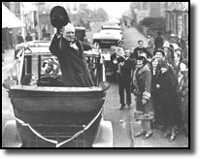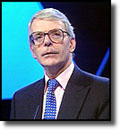
|
The Conservative Party
Conservative Central Office 32 Smith Square Westminster London SW1P 3HH Tel: 0171-222 9000 Fax: 0171-222 1135/0171-222 8578 www.conservative-party.org.uk e-mail:www.conservative-party.org.uk/email Click here to read the Conservative manifesto 1997. History of the UK Conservative Party The party claims to be the oldest political party in Europe and the name "Conservative" was first used in 1830 although the word Tory (the Irish for "robber" or "savage") is often used as an alternative. In 1886 the Liberal Party split over the issue of Irish Home Rule and the Liberal Unionist Party was formed. This party worked in alliance with the Tories before finally being absorbed into the Conservative Party in 1912 resulting in the current party's full title of "The Conservative and Unionist Party". Traditional conservatism stands for the monarchy, law and order and free enterprise with a minimum of state interference in business. Despite being largely a middle-class organisation it has always attracted a great deal of working-class support. The party has also enjoyed the regular backing of the land owning aristocracy and of successful businessmen. The early Tories of the seventeenth century supported the powers and prerogatives of the Crown, believing that these powers acted as a check on the interests represented in parliament. Their main opposition, the Whigs, meanwhile wanted more parliamentary control. The Whigs dominated the eighteenth century until the Conservative William Pitt the Younger became prime minister in 1783 at the age of twenty-four. With just one interval he led the Government for the next twenty-one years. His support for free trade and sound finance laid the basis of modern Conservatism. Although he was a reformer Pitt the Younger became a staunch defender of the status quo following the French Revolution. Despite opposing the 1832 Reform Act which had significant effects on parliament and its powers, the Tories came to terms with parliamentary reform under the leadership of Sir Robert Peel. The Peel Government of 1841 to 1846 also introduced a programme of financial, economic and social reforms such as the prohibition of the employment of women and children in factories. In 1846 Peel abolished the Corn Laws which maintained the price of food at an artificially high level. This move caused a serious split in the Conservative Party with some believing it would damage the interests of those involved in agriculture. This split - essentially between free-traders and protectionists - kept the Tories out of power for most of the following 20 years. Under Benjamin Disraeli the splits were healed and in opposition after 1868, Disraeli reorganised his party and produced a distinctive agenda. This new programme was based on the need to improve the nation's traditional institutions, to improve the social conditions of the less well off and to strengthen Britain's position in the world. Moving into the twentieth century the party resisted the granting of Home Rule to Ireland which it feared would break up the United Kingdom. In 1931 the Conservative Party joined Labour dissidents led by the former socialist Ramsay MacDonald in order to form a National Government to cope with the economic crisis. In 1937, Neville Chamberlain became prime minister and but his period in office ended in failure when his policy of appeasing Hitler collapsed and Britain entered World War II. Winston Churchill replaced him as prime minister in 1940 at the head of an all-party government. Following the war the Conservatives suffered from a Labour landslide in the 1945 election as the nation called for social change. By 1951, however, the Tories, still led by Churchill, were back in power.
But in 1964, with Sir Alec Douglas-Home as prime minister, the economy was in recession and the party was beset by the Profumo scandal. Labour returned to power in the election of that year. Following the fall of Harold Wilson's Labour Government in 1970 the Conservatives re-entered government under the leadership of Edward Heath. But he incurred problems when the trade unions resisted the Industrial Relations Act and an international economic crisis was created by sharp rises in the price of oil. But Heath did take Britain into the European Economic Community. Heath called a snap election in February 1974 on the theme of "who governs Britain?". Despite winning the greater share of the vote, the party lost the 1974 election but returned to power under the leadership of Margaret Thatcher - the first woman prime minister - in 1979. She pursued an aggressive and confrontational right-wing programme and throughout the 1980s the Conservative government reduced the powers of the trade unions and in a programme of deregulation began to privatise many of the nationalised industries. In the 1990s
Major's main achievement during his first two years in power was to secure several opt-outs for Britain from the 1991 Maastricht Treaty. His other important decision was to decide when to go to the country and rather than deciding to go after the Gulf War he chose April 9 1992. Despite a severe recession and deep splits over Europe following the signing of the Maastricht Treaty the party surprised many pollsters by winning a fourth consecutive General Election. With the party falling in the polls, failing in by-elections and facing internal splits over Europe, Major gambled in June 1995 by resigning as head of the party and forcing a leadership election. He said that those who wanted him replaced could "put up or shut up". In the event John Redwood, the Welsh Secretary, resigned from the Cabinet to challenge him. Major won through, taking 66% of the vote compared to Redwood's 27%. Europe has been a problematic subject for the party during the past five years. In November 1994 eight Conservative MPs defied the party whip and abstained on a vote concerning the European Communities (Finance) Bill. The whip was then taken away from the eight and Sir Richard Body joined them by resigning the whip despite having voted with the Government. Mr Major was also reported to have described the right-wing Eurosceptic members of his Cabinet as "bastards". Sleaze has also haunted the party. At the 1994 Conservative Party conference in Blackpool Mr Major announced a "back to basics" campaign. Sadly for him this caused a continual stream of press stories regarding the private lives of Conservative MPs and ministers, several of whom were forced to resign. Heritage Secretary David Mellor was the first to go when an extra-marital affair was revealed and Tim Yeo resigned as an environment minister when it was revealed he had fathered a secret love child. David Ashby also resigned as a parliamentary private secretary after admitting that he had once shared a bed with a man and Hartley Booth also gave up his position as a PPS when he admitted to an infatuation with a female researcher. Other problems concerning sleaze of a financial nature also affected the party. Tim Smith and Neil Hamilton resigned as ministers when The Guardian published claims that they had accepted money from Harrods' owner Mohammed Al Fayed to table parliamentary questions. Jonathan Aitken also stepped down as Chief Secretary to the Treasury following newspaper reports that he had lied to the cabinet over who paid his bill during a stay at the Paris Ritz. David Willetts, the paymaster general, also resigned following a report by the Standards and Privileges Committee which accused him of "dissembling". The party has also suffered from several defections. During the 1995 Conservative Party conference it was revealed that Alan Howarth was joining the Labour party. Then in 1996 Emma Nicholson joined the Liberal Democrats and she was followed by Peter Thurnham. In March 1997 Sir George Gardiner, who had already been deselected as the party candidate for his seat of Reigate, resigned the Tory Whip and joined the Referendum Party. Sir John Gorst also resigned the Conservative whip and told the government it could not rely on his support because of the closure threats to a hospital in his constituency. Sir George Gardiner had been deselected when he accused Major of being Chancellor Kenneth Clarke's ventriloquist's dummy in a newspaper article. But he was not the only Tory MP to have been deselected as his constituency's candidate. Sir Nicholas Scott was deselected in December 1996 following a vote of no confidence in his constituency. The move followed several incidents including his arrest for drink-driving and for failing to stop at a road accident. He had already been through one vote of confidence but his constituency voted for deselection when he was found in a gutter during the Conservative Party Conference. The Six Week Campaign On March 17 1997, John Major ended months of speculation by officially declaring the May 1 election date. The party had a campaign war chest of between £20 and £40 million depending on whose estimates are to believed. The Conservatives entered the campaign trying to paper over severe cracks regarding Europe. Although the "whipless rebels" returned to the fold, the Government had a minority of three. The Referendum Party stood against Europhile Tories, including both the Chancellor, Kenneth Clarke, and the Prime Minister, who faced botanist and TV personality David Bellamy in his Huntingdon constituency. Sir James's party aimed to keep the debate over Europe high up the election agenda, to further accentuate the Conservative party's splits over the issue. In the end, the Referendum Party secured only 2.7% of the vote: it was not the force to shake the Conservatives that some had feared. Arguably though, its presence dented winning Conservatives' majorities as well as heaping added humiliation on those who lost. At the Polls The Conservatives had their worst electoral performance this century/since 1945, gaining only 165 seats from 31.4% of the vote. About a quarter of the Opposition MPs are new to the Commons. Some 38 ministers lost their seats, including a record number of 7 Cabinet ministers. These included Malcolm Rifkind, Foreign Secretary; Ian Lang, Trade Secretary; Tony Newton, Leader of the House; William Waldegrave, Chief Secretary to the Treasury, and Roger Freeman, Chancellor of the Duchy of Lancaster. Other notable defeats included Rupert Allason losing Torbay seat by a slim 12 votes; an 18.8% swing against Sir Rhodes Boyson in Brent North; Edwina Currie departing from Derbyshire South and Lady Olga Maitland from Sutton & Cheam. Speculation that Defence Secretary Michael Portillo would be a favourite contender for a post-election leadership battle, was dramatically stumped as he lost his Enfield Southgate seat to a 27-year-old Labour candidate. The Scottish Secretary, Michael Forsyth, also lost his seat; in fact, not a single constituency in Scotland or Wales elected a Conservative MP. AftermathThe new leader promised a root and branch overhaul of the party's structure and constitution. He told party members that they had to learn the lessons of the election defeat if they wanted to return to power. He said MPs, councillors and ordinary party members who brought the party into disrepute would no longer be tolerated. An early test of Mr Hague's leadership was the Uxbridge by-election on July 31st which was caused by the death of Conservative MP Sir Michael Shersby. The Tories held the seat, increasing their majority by more than 3,000 votes. Conservative Party Home PageExternal links are not endorsed by the BBC |
Diana, Princess of Wales, 1961-1997
Conference 97
Devolution
The Archive
News |
Issues |
Background |
Parties |
Analysis |
TV/Radio/Web
Interactive |
Forum |
Live |
About This Site
News |
Issues |
Background |
Parties |
Analysis |
TV/Radio/Web
Interactive |
Forum |
Live |
About This Site
© BBC 1997 |
politics97@bbc.co.uk |


